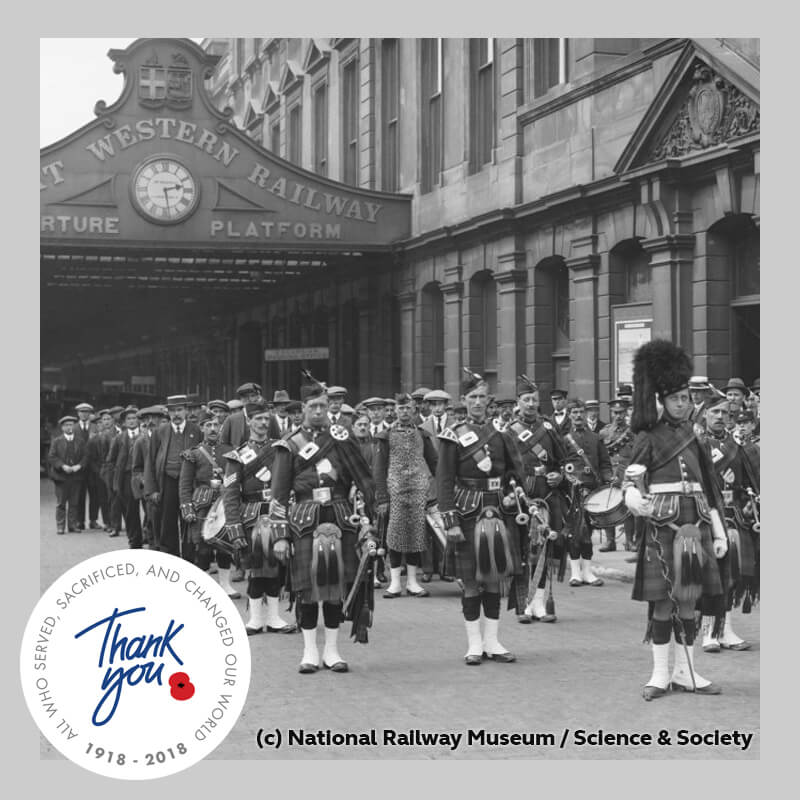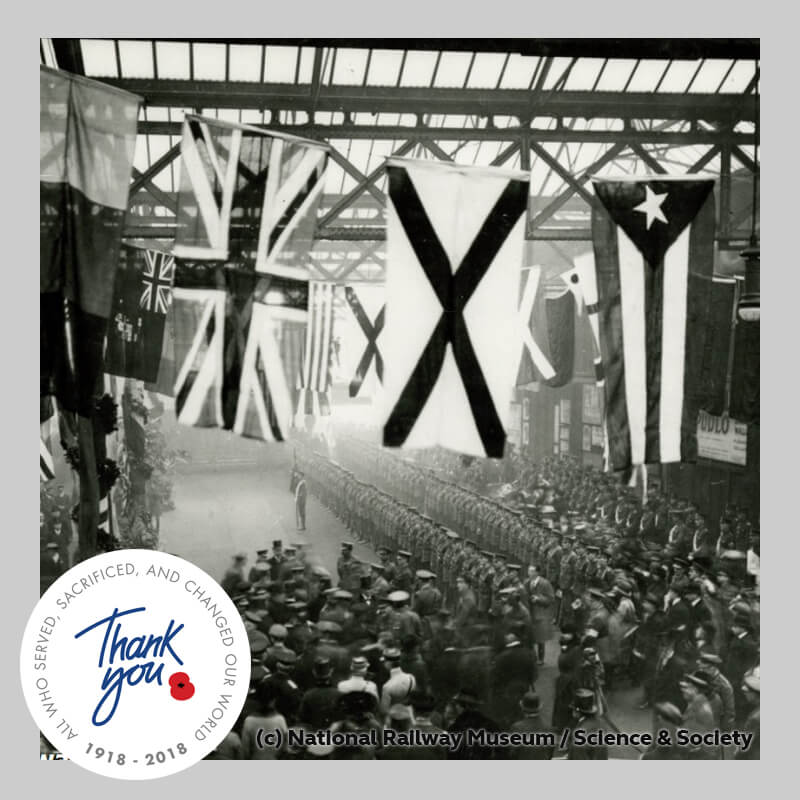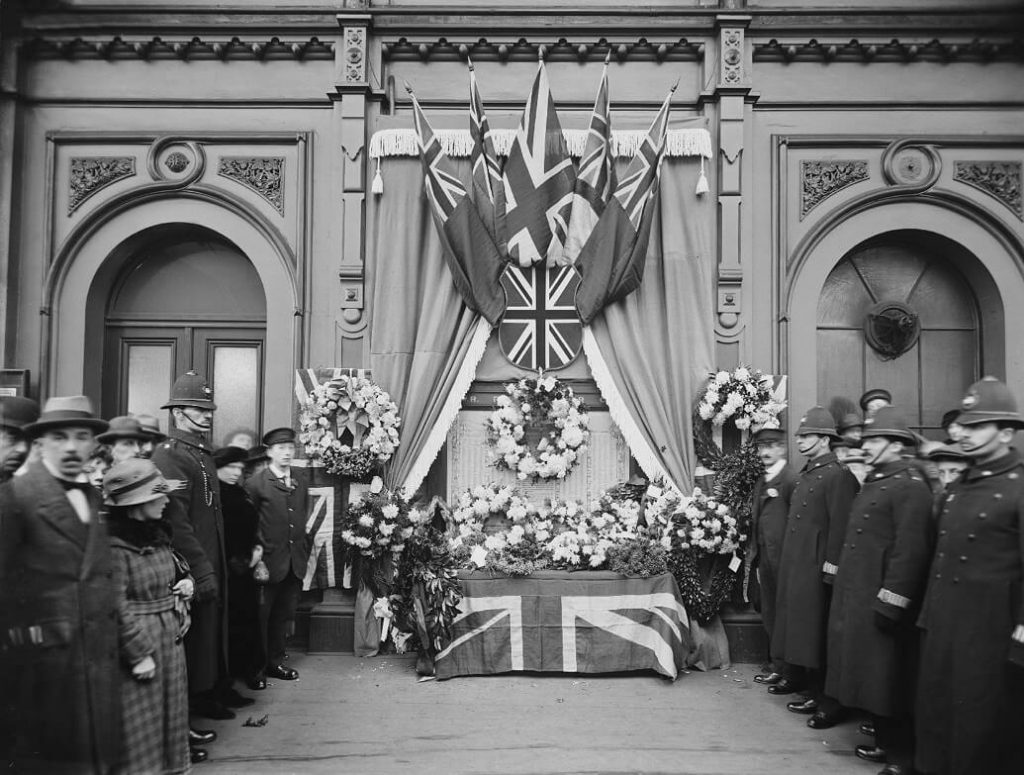About 20,000 railway workers from Britain lost their lives during WWI, after more than 100,000 enlisted when war broke out.
More than a century after the end of WWI, we join The Royal British Legion in saying thank you to all who served and sacrificed.
Last year, in remembrance, Network Rail employees submitted stories of their ancestors in the conflict, including some connected to the railway:

George Albert Buttress, a Private in the Cambridgeshire Regiment (born 17 March 1890, died 26 August 1977)
Ancestor of Greg Dash, a train running controller in Network Operations
From the Chesterton area of Cambridge, electricity and technology enthusiast joined the Great Eastern Railway at Cambridge as an apprentice electrician after school. He enlisted as a Private with the Cambridgeshire Regiment just after the outbreak of war, and the birth of his daughter Jean.
He also provided electricity and yard lighting to the huge Whitemoor marshalling yards in Cambridgeshire, where railway wagons were made into trains with early electro-pneumatic equipment.
During WW2, in his 40s, George was too old to fight but continued to work on the railway, dealing with wagons carrying vital supplies, ammunition and food at Whitemoor. The depot became an important target for German bombers, leading to the construction of a decoy yard a few miles away.
George retired from the railway in 1956, after which he still did the odd residential electrical job. Not long before he passed away in August 1977, at the age of 87, he had climbed onto his roof to fix an aerial.
Albert Wheeler, a Private in the Royal Engineers (born 26 February 1888, died 20 May 1964)
Ancestor of Kim Wheeler, a front of house coordinator

Albert worked for the Midland Railway as a railway fireman. The family story goes that in July 1915, while having a drink, Albert was offered the King’s shilling; as he wanted to continue drinking he accepted it. When he had sobered up by the next day, he had the task of telling his pregnant wife Nelly that he had enlisted.
He joined the Worcestershire Regiment and transferred to the 1st Garrison Battalion, Royal Warwickshire Regiment. Albert was posted to Egypt on 20 August 1915, just weeks after the birth of his son, George.
In 1917, Albert was transferred to the Royal Engineers and posted to the Railway Operating Division due to his skills as a locomotive fireman – a stoker who keeps a train’s boiler running.
Albert helped to build the Kantara Military Railway and also fought in Egypt, where he narrowly avoided death thanks to a solider from the British West Indian Regiment. Albert came home in 1919 and in 1954, his daughter Joyce began a relationship with a man called Iran, from the West Indies.
Kim said: “At this time, most West Indians found it hard to find work, a home, or even be accepted. My grandfather said that he had no problem with the relationship, as he always said that if it wasn’t for that West Indian soldier there then, he wouldn’t be alive to tell the tale.”

Walter Henry Hooton, a Lance Corporal in the Bedfordshire Regiment (born 7 April 1892, died 15 January 1941)
Ancestor of James Ambrose, a principal engineer
Henry was sent to a railway-sponsored orphanage, St Christopher’s, aged 14 – his father died when he was two and his mother when he was 14.
From here he moved to another orphanage, in Dover, where he trained as a musician. At 15 he joined the Army and became a bandsman. Rising to the rank of Lance Corporal with the Bedfordshire Regiment, he served in France and was gassed and twice wounded.
While in hospital recovering from his wounds, he met his future wife Jane, a cook at the hospital.
After the war, Walter remained a bandsman playing at various venues in his hometown of Derby.
James said the war had greatly affected Walter. He said: “Walter would go ‘walkabout’ at night. Concerned for his safety his wife would follow him. With the coming hostilities of World War II, his condition got worse and he attempted suicide.
“When his nephew, who was a gunner with RAF Bomber Command, was killed during a raid on the Nazi invasion barges in 1940, he attempted suicide again by walking into a bus. Walter survived but was committed to Derby Kingsway (mental) hospital and died there in 1941 of pneumonia, aged 48.”